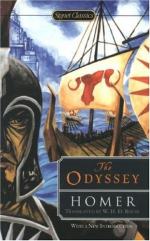to be interpolations. It is possible, indeed,
that in its leading outline, the Iliad may be true
to historic fact; that in the great maritime expedition
of western Greece against the rival and half-kindred
empire of the Laomedontiadae, the chieftain of Thessaly,
from his valour and the number of his forces, may
have been the most important ally of the Peloponnesian
sovereign: the pre-eminent value of the ancient
poetry on the Trojan war may thus have forced the
national feeling of the Athenians to yield to their
taste. The songs which spoke of their own great
ancestor were, no doubt, of far inferior sublimity
and popularity, or, at first sight, a Theseid would
have been much more likely to have emanated from an
Athenian synod of compilers of ancient song, than
an Achilleid or an Odysseid. Could France have
given birth to a Tasso, Tancred would have been the
hero of the Jerusalem. If, however, the Homeric
ballads, as they are sometimes called, which related
the wrath of Achilles, with all its direful consequences,
were so far superior to the rest of the poetic cycle,
as to admit no rivalry,—it is still surprising,
that throughout the whole poem the callida junctura
should never betray the workmanship of an Athenian
hand; and that the national spirit of a race, who have
at a later period not inaptly been compared to our
self-admiring neighbours, the French, should submit
with lofty self-denial to the almost total exclusion
of their own ancestors—or, at least, to
the questionable dignity of only having produced a
leader tolerably skilled in the military tactics of
his age.”
To return to the Wolfian theory. While it is
to be confessed, that Wolf’s objections to the
primitive integrity of the Iliad and Odyssey have
never been wholly got over, we cannot help discovering
that they have failed to enlighten us as to any substantial
point, and that the difficulties with which the whole
subject is beset, are rather augmented than otherwise,
if we admit his hypothesis. Nor is Lachmann’s
modification of his theory any better. He divides
the first twenty-two books of the Iliad into sixteen
different songs, and treats as ridiculous the belief
that their amalgamation into one regular poem belongs
to a period earlier than the age of Peisistratus.
This as Grote observes, “ex-plains the gaps and
contradictions in the narrative, but it explains nothing
else.” Moreover, we find no contradictions
warranting this belief, and the so-called sixteen
poets concur in getting rid of the following leading
men in the first battle after the secession of Achilles:
Elphenor, chief of the Euboeans; Tlepolemus, of the
Rhodians; Pandarus, of the Lycians; Odins, of the
Halizonians: Pirous and Acamas, of the Thracians.
None of these heroes again make their appearance,
and we can but agree with Colonel Mure, that “it
seems strange that any number of independent poets
should have so harmoniously dispensed with the services
of all six in the sequel.” The discrepancy,
by which Pylaemenes, who is represented as dead in
the fifth book, weeps at his son’s funeral in
the thirteenth, can only be regarded as the result
of an interpolation.




